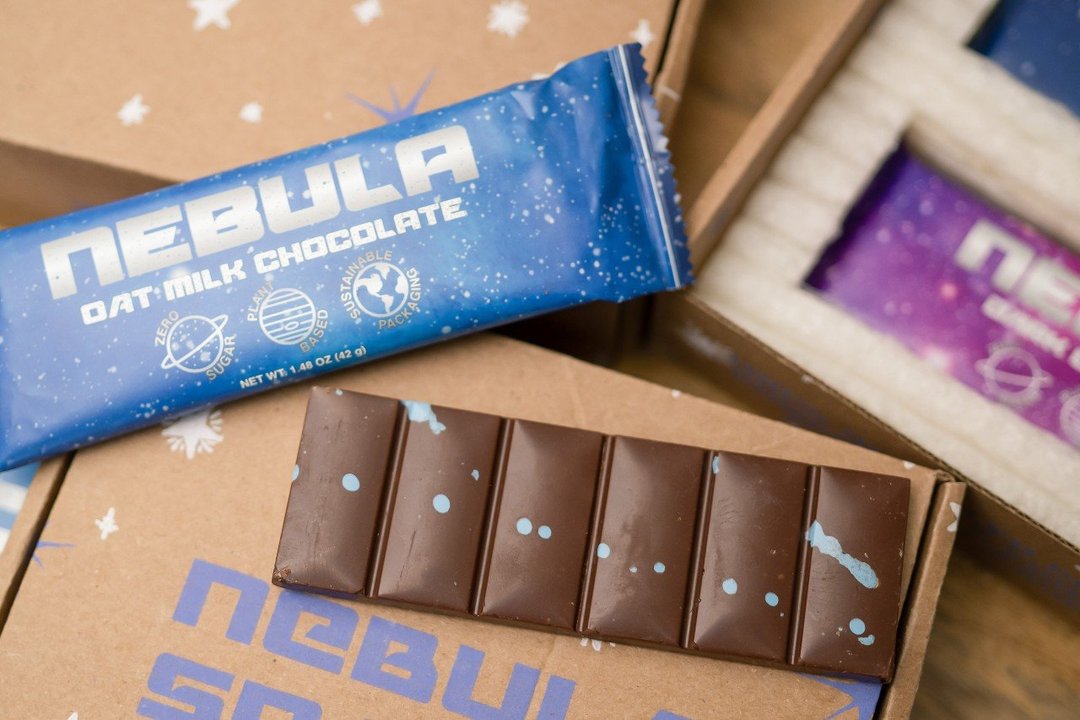Sweet spot: How are young food and drink brands cutting sugar from their products?
Brands selling low and no-sugar products are experimenting with different sweeteners in a bid to reduce sugar without compromising on taste.

Nebula Snacks uses monk fruit and allulose to sweeten its chocolate bars. (Photo: Nebula Snacks)
BETTER FOR YOU BRANDS
Sugar is intoxicating: researchers say it activates the same neural circuits as cocaine and opioids. It also triggers our brains to release a hit of dopamine — meaning we’re more likely to associate the consumption of sugar, cereals and sodas with feeling good. Nevermind the sugar crash later.
The problem is, in the volumes it’s eaten today, sugar isn’t actually that good for us. The average American consumes about 77g of added sugar per day, mostly through drinks and snacks, according to the American Heart Association. This is well over the World Health Organization’s recommendation that added sugar is limited to about 5% of total calorie intake per day (so about 25g for a 2,000 calorie diet).
As awareness grows over the negative health impacts of excess sugar consumption, new brands launching today see low or no-sugar messaging as a no-brainer. But this leads them to a trickier question — how can they reduce sugar without compromising on taste?
Sugar substitutes: choose your fighter
Brands have found plenty of ways to reduce the amount of added sugar in their products. Chocolate bar brand Spring & Mulberry uses dates instead of granulated sugar to add sweetness to its bars, while baked goods brand Raize uses a combination of stevia, erythritol and monk fruit to make cookies that have just 1-3g of net carbohydrates. Gummy bear brand Behave has four zero-sugar sweeteners in its arsenal — monk fruit, allulose, chicory root fiber and soluble tapioca fiber — and MiiRO uses “slightly fermented” chicory root fiber as part of its sweetener mix, which it says helps to avoid the common side-effect of tummy aches that comes with this ingredient.
David Jacobowitz, the co-founder of Nebula Snacks, estimates that he tried 30-40 different recipes before settling on the combination of sweeteners that worked best. Sweeteners that were crossed off the ingredients list included stevia (which has a “tough to control aftertaste,” Jacobowitz says), coconut sugar (an unrefined sugar which was soon deemed not much healthier than the refined sugars Nebula was trying to avoid), agave and erythritol.
The final product contains a mixture of allulose and monk fruit, and it took six months to refine this combination and get the right balance of sweetness, without any bitter aftertaste (this is a risk with monk fruit, which is 150 times sweeter than sugar).
@thingtesting Testing sugar-free vegan chocolate from @nebulasnacks 🪐 #chocolate #healthyfoodideas #reviews #thingtesting #chocolaterecipe #nebula #productreviews ♬ original sound - Thingtesting
“We wanted a low calorie sugar alternative, and we also wanted enough sweetness from it so you actually get that taste. We were also fascinated with the glycemic index — a sweeter that wouldn’t raise your blood sugar,” Jacobowitz says. Allulose and monk fruit ticked these boxes, while some zero calorie sugar alcohols (such as xylitol and sorbitol) can cause blood sugar spikes, which took them out of the running.
Indeed, the world of sugar alternatives is complex. There are concerns around the safety of some of these ingredients, particularly if they have not been part of the human diet before. Others can cause unpleasant side effects — sorbitol, erythritol and xylitol have all been accused of increasing flatulence, for example.
Some substitutes are better suited to certain products than others. When experimenting with sweeteners for her low-carb cheesecake brand Wonder Monday, founder Candace Wu found that the fruity aftertaste of monk fruit only really worked if the cheesecake itself was a similarly fruity flavor. Erythritol, meanwhile, left a “cooling, minty aftertaste in the mouth,” which again, wasn’t suitable for most cheesecake flavours.
In the end, the brand settled on allulose, a natural sweetener that delivers about 70% of the sweetness of sugar.
@thingtesting Testing better-for-you mini cheesecakes from @wondermonday 🍰 #thingtesting #betterforyou #snacks #productreviews #cheesecake #branding #ketoforbeginners #100calories ♬ original sound - Thingtesting
While recipe formulators now have more choice and understanding when it comes to sugar alternatives these days, it’s also true that a ‘perfect’ sugar alternative does not exist — and our brains can tell the difference. Jacobowitz says that some customers have shared that Nebula’s bars don’t provide that hit of sweetness that they expect from a chocolate bar.
“Big Sugar has hooked all of us on the taste,” says Jacobowitz. “This is a taste profile that your taste buds have to get used to.”